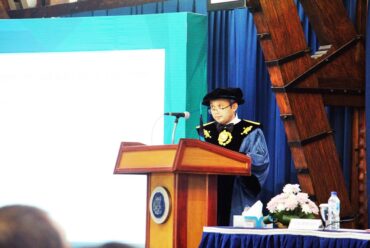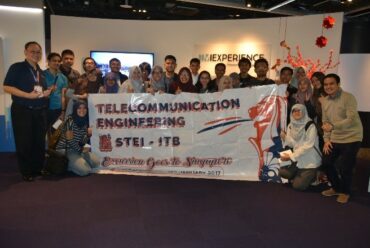Dr. Wikan Explaining About Relationship Between Open Data and Smart City in Webinar Series
BANDUNG, itb.ac.id – The Center for Artificial Intelligence at the Bandung Institute of Technology (ITB) and the Center of Knowledge for Business Competitiveness at SBM ITB held a Smart City Webinar Series in Indonesia, Thursday, May 14, 2020. The webinar invited several speakers, one of whom was Dr. techn. Wikan Danar Sunindyo , lecturer at the School of Electrical Engineering and Informatics (STEI) ITB, who is also the guide for the movement towards 100 Smart Cities of the Ministry of Communication and Information for Mimika Regency, Bantul Regency, Kulonprogo Regency, Sragen Regency.
” Open Data is public data that can be accessed and can be used by communities, companies and organizations to launch new ventures, analyze patterns and trends, make data-based decisions, and solve complex problems,” said Dr. Wikan when explaining his material about Open Data for Smart City.
Dr. Wikan explained, the scale of the distribution of Open Data is divided into five categories, namely Star One is a type of data available on the web in any format and has an open license. An example is population data in pdf format. “The Two Star category is structured data that is machine-readable, meaning that it can be processed in a special application (propietary). For example, is data in Excel which can only be processed in Excel, ”he said.
Furthermore, Bintang Tiga, which is structured data that is machine-readable but in a non-proprietary format , meaning that it can be opened in other applications. For example, files in .csv or .txt format. Bintang Empat, using the open standards from W3C (RDF and SPARQL) to identify something. Five Star, is data that can be linked to other data to provide context.
According to him, this Open Data system can also be used to build an Open Government system which also consists of four aspects. “The first aspect is transparency, namely the government’s duty in releasing data regarding the operations that are running in its institution. The second aspect is participation, which means receiving input from the community. Collaboration aspect, which involves the public in finding solutions. And the last aspect is the government as a platform, which means that the government releases data containing issues of public concern, such as health, environment and industry, “explained Dr. Wikan.
He continued, Open Government Data must also adhere to several principles, including the available data must be complete, primary, have a clear time, can be accessed, can be processed, is not discriminatory, or is only allowed for certain parties, non-propietary (not owned by certain parties), and the last one is free.
Dr. Wikan also shared the main reasons why Open Government Data is needed. The first is to have the advantage of increasing public trust and increasing public participation. Second, it can generate a fast response to a rapidly changing problem. Third, it can improve relations with the public and finally, facilitate smart cities . ” Open government partnership in Indonesia began during the era of President Susilo Bambang Yudhoyono, which was previously managed by UKP4, currently the areas that have been used as pilots for smart cities are DKI Jakarta, Bandung City, and Bojonegoro Regency,” he explained.
Currently, thousands of such data can be accessed at https://data.jakarta.go.id/, http://data.bandung.go.id/, https://siipp.net/Home, which hopefully can be used by researchers , journalists, academics, the general public, the private sector for the basis of decision making, and visualization needs. “Data in Indonesia itself is currently being developed at data.go.id and there is also the Indonesian One Data Forum which aims to standardize, synchronize data, and ensure interoperability of cross data,” he said.
Dr. Wikan hopes that the synergy of Indonesian data can mutually strengthen and help to facilitate regulatory and institutional arrangements. In closing, he also invited local governments who were present at the webinar to start using the one data system in accordance with the SPBE (Electronic Based Government System) and also Presidential Decree No. 39 of 2019 concerning One Data.
Reporter: Salsabila Tantri Ayu (Kimia, 2016)
based on news published on l safe itb



